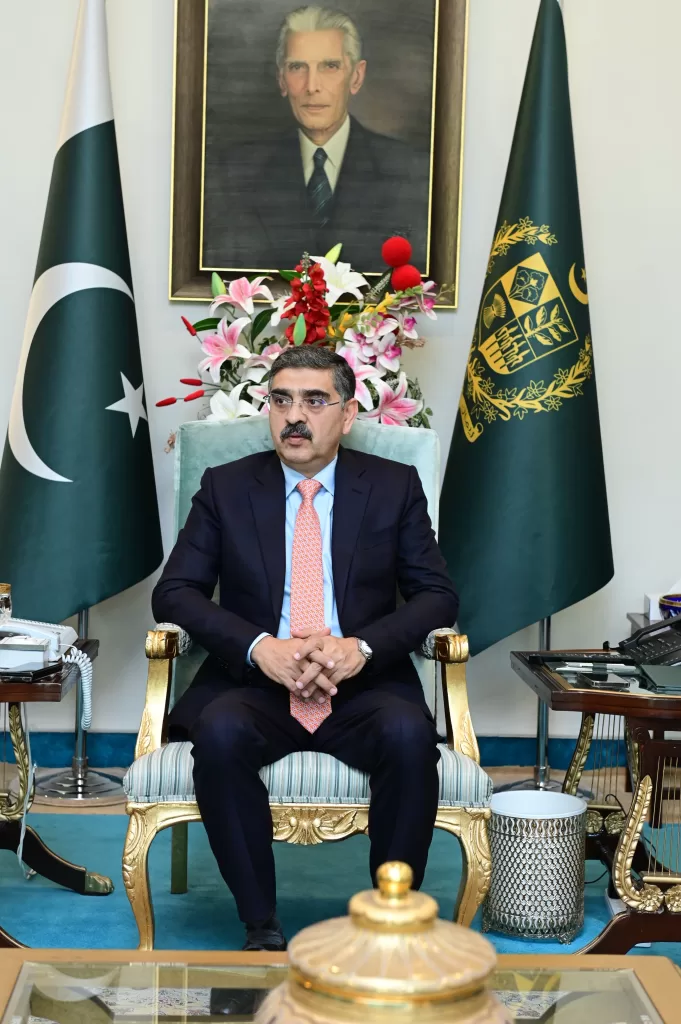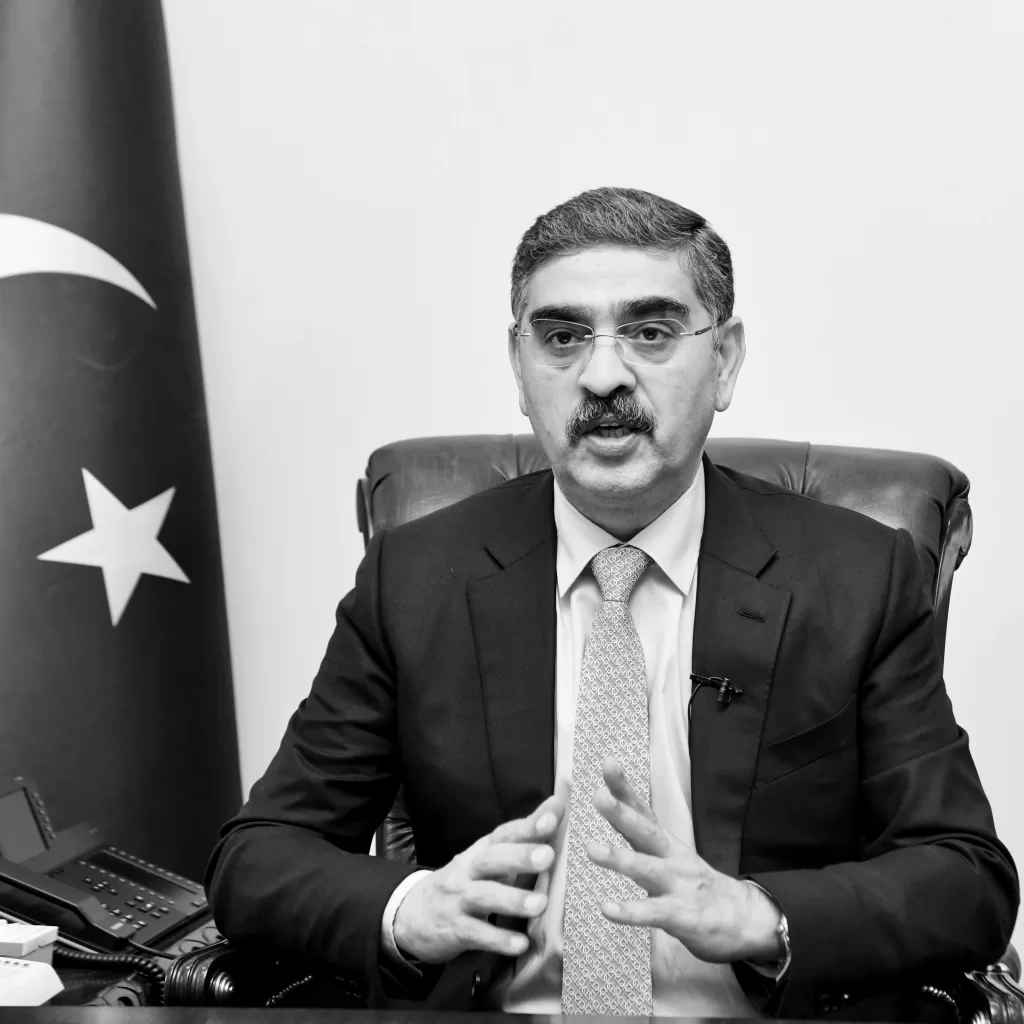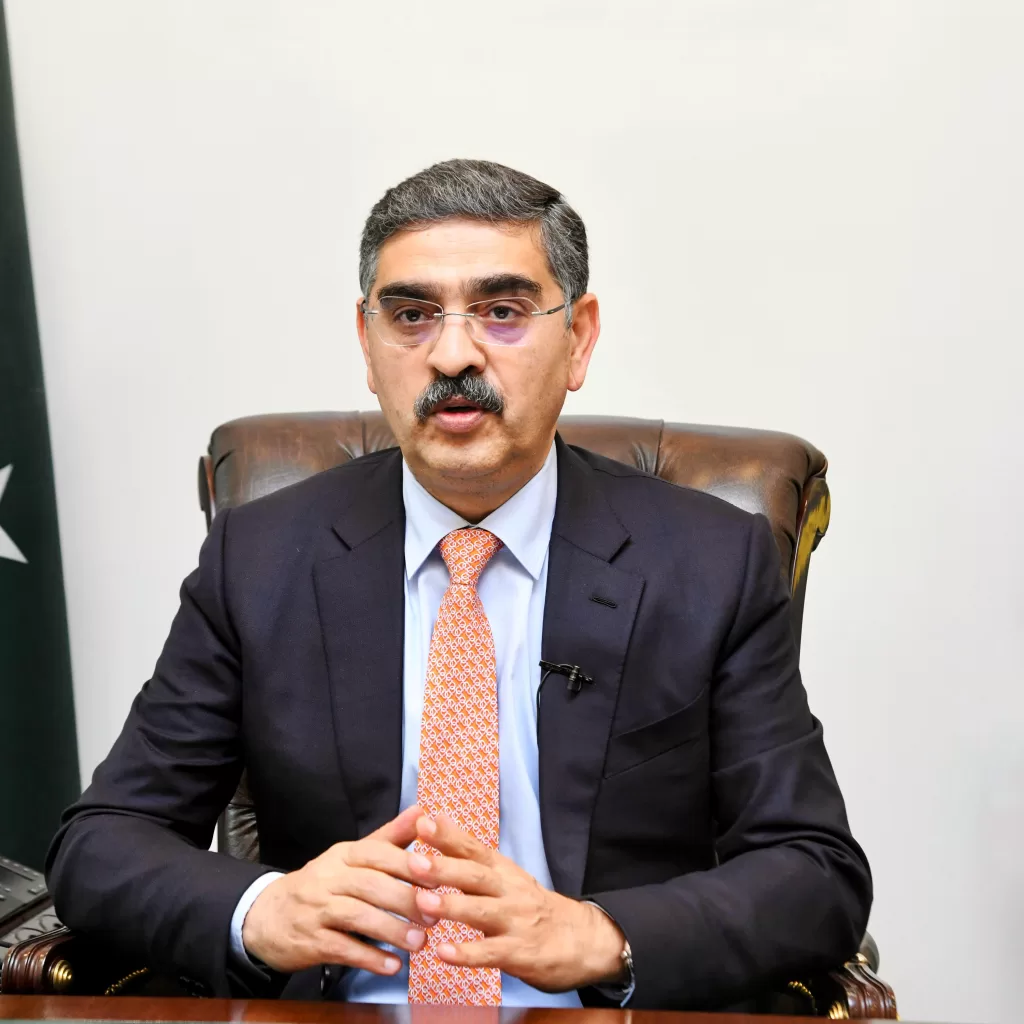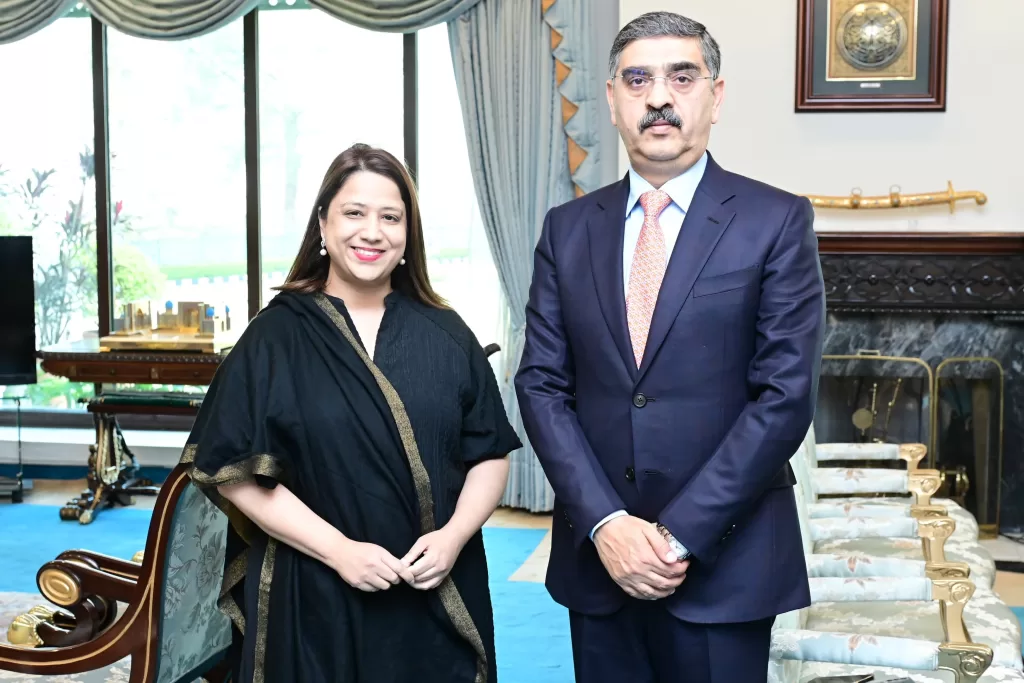An Exclusive Interview of Prime Minister Anwaar-ul-Haq Kakar
1. What initial goals and aspirations motivated you to enter politics?
My motivation to enter politics stemmed from a deep desire to serve my country and contribute to its development. My initial goals and aspirations were to bring about positive change, address the issues faced by the people, and work towards the progress and prosperity of Pakistan.
2. What made you accept the role of caretaker Prime Minister?
Accepting the role of caretaker Prime Minister was a great responsibility as well as a unique honour. I accepted this responsibility to ensure a smooth transition of power and uphold the democratic process. It was a crucial position that required impartiality and dedication to serving the nation during the interim period.
3. Why is the true role of the Caretaker Government difficult for the masses to understand?
The true role of the Caretaker Government is to ensure the continuity of the constitutional order and government functions and provide stability during the transition period. It is a temporary role that focuses on maintaining law and order, conducting free and fair elections, and facilitating the incoming government’s transition. The complexity of this role may sometimes make it challenging for the general public to fully understand its nuances.
4. What role did you play in its formation and development of the Balochistan Awami Party?
My involvement in the Baluchistan Awami Party (BAP) stems from my commitment to addressing the issues faced by the people of Balochistan. I was one of the founding members of the party and played a significant role in the formation and development of the party, working alongside like-minded individuals to represent the interests of the province and its people.
5. What are you most proud of specific contributions to Balochistan and Pakistan?
The proudest moment is that I am representing my country and people in the world as caretaker prime minister. It is a matter of honor for me that all the coalition parties and the opposition in the previous government expressed their confidence in me and proposed my name as caretaker prime minister.
Throughout my political career, I have worked tirelessly to promote peace, development, and prosperity in Balochistan. My focus has been on addressing the root causes of extremism and terrorism, fostering economic growth, and improving the lives of the people through various initiatives.
6. Can you elaborate on your role to address the root causes of extremism and terrorism in promoting peace and development in Pakistan, especially Balochistan?
My role in promoting peace and development in Pakistan, particularly in Balochistan, involves a comprehensive approach. We are taking steps to address the root causes of extremism and terrorism by promoting education, economic opportunities, and inclusive governance. We are also working to improve the security situation and encouraging dialogue and reconciliation among different stakeholders.
7. What steps are being taken to address the challenges of poverty, inequality, and infrastructure development in Balochistan?
Addressing the challenges of poverty, inequality, and infrastructure development in Balochistan is a priority for us. We are implementing strategic plans to uplift the socio- economic conditions in the region, focusing on education, healthcare, job creation, and infrastructure projects.
We are also working to ensure equitable distribution of resources and opportunities. The China Pakistan Economic Corridor (CPEC) is yet another great opportunity that is changing the fate of the people of Pakistan and Balochistan in particular.

8. What are your comments about this exceedingly sensitive subject matter of women’s rights and women’s political prisoners as far as human rights are concerned?
Women’s rights and the issue of political prisoners are critical aspects of human rights. The government is committed to fostering an environment where all citizens, irrespective of gender and ethnicity, enjoy their rights. Initiatives are in place to address concerns raised by the media in this regard.
I believe in gender equality and women’s empowerment. We are committed to creating an enabling environment where women can actively participate in politics and decision-making processes. Efforts are underway to protect women’s rights, ensure their safety, and promote their representation in all spheres of society.
9. How can gender equality and women empowerment be achieved given the deteriorating situation in all sectors and with Pakistan bound to work towards Sustainable Development Goals (SDGs)?
We recognize the importance of empowering women economically, socially, and politically. To achieve this, we are working on policies and initiatives that promote gender equality, provide equal opportunities for women, and address the barriers they face in accessing education, healthcare, and employment. SDG support units have been established at federal and provincial levels to guide SDGs implementation and monitoring. Several initiatives such as the Balochistan Education Project and the Balochistan Comprehensive Development and Growth Strategy (BCDGS) 2021-2026 have been launched to accelerate the achievement of SDGs.
10. How will you ensure that the voices of all citizens are heard and considered in the electoral process?
Indeed! Caretaker government is for this purpose, we will take every step to ensure free and fair elections. All political parties are being given equal opportunities to participate in the political process. We are also working to increase voter education and engagement to ensure a fair and participatory election process.
11. Considering the recent surge in terrorist attacks and the overall security situation, what specific measures are being taken ensure a safe and secure environment for all citizens during the upcoming elections and the threat of terrorism and violence?
As the Prime Minister of Pakistan, I prioritize the safety and security of all citizens during the upcoming elections. To address the threat of terrorism and violence, specific measures are being taken. We are strengthening intelligence and security agencies’ coordination, enhancing border security, and implementing strict measures to prevent terrorist attacks. Additionally, we are promoting community engagement programs, fostering trust between law enforcement agencies and communities, and implementing effective counter-terrorism strategies. These measures aim to create a safe and secure environment for all citizens to exercise their democratic rights.
12. How will you ensure a level playing field for all political parties and candidates during the electoral campaign?
We are committed to creating a level playing field, ensuring equitable access to resources, media, and public spaces for all political parties and candidates. Ensuring a level playing field for all political parties and candidates is crucial for a fair electoral campaign. To achieve this, we are committed to upholding the principles of transparency and inclusivity.

13. How will you be able to successfully address the issue of fake news and disinformation campaigns aimed at influencing the elections?
Fake news and disinformation campaigns can significantly impact the integrity of elections. Tackling fake news is a priority. We are implementing measures to enhance media literacy, collaborating with platforms to curb misinformation, and fostering a transparent communication strategy to counter disinformation. Apart from this, it is also the responsibility of the media to prevent fake news, and we hope that the media realizes its responsibility in this regard. Above all, the public, the consumers, are also urged to exercise caution.
14. What will you do to ensure a peaceful and orderly transition of power after the elections?
Indeed! The purpose of the caretaker government is to hand over power to the elected representatives in a peaceful manner, and we will do it well, In Shah Allah! We will closely cooperate with relevant institutions, political parties, and stakeholders to ensure a smooth transition process. Upholding democratic values and respecting the will of the people will be paramount in this transition.
15. With a great deal of fear attached among citizens in the recent months that there will be backlash upon them for voicing their opinions freely, how will you ensure that this will not happen?
The freedom of expression and the right to voice opinions freely are fundamental rights protected by the Constitution of Pakistan. As the Prime Minister, I assure all citizens that there will be no backlash for exercising their right to freely express their opinions. We are committed to creating an environment that encourages open dialogue, constructive criticism, and respect for diverse perspectives. Any attempts to suppress or intimidate individuals for voicing their opinions will be dealt with strictly according to the law.
16. What is being done in Pakistan to stabilize the economy and restore investor confidence while addressing the current economic crisis, rising inflation, unemployment, and poverty?
In order tackle economic challenges, we have diversified approach. Its key pillars are fiscal reforms, prudent monetary policies, strategic investments in essential sectors like infrastructure, agriculture, and technology, improving governance and regulatory frameworks, and prioritizing investor confidence through various initiatives, simplify regulatory procedures, and encourage foreign investment. These measures aim to control inflation, stabilize the currency, and drive economic growth and employment. I would like to highlight that under our administration, we have seen a reduction in inflation and a substantial reduction in oil prices as well. Moreover, our efforts have increased exports, and we have successfully reduced the current account deficit. For promoting investment, Special Investment Facilitation Council (SIFC) has been setup with a “whole of the government approach.” SIFC is facilitating investment from our friendly countries, particularly in agriculture, minerals, IT, and other sectors.
We have successfully concluded a staff-level agreement on the first review of Stand-By Arrangement (SBA) with IMF. It is noteworthy that our foreign exchange reserves have increased significantly during our tenure. Inshah Allah, we will hand over a stable economy to the incoming government.
17. What will you do to address the energy crisis in Pakistan and ensure a reliable and affordable supply of electricity for homes and businesses?
The solution to the energy problem is not possible with short-term projects, as it requires long-term planning which is already underway. The construction of big dams is going on at a fast pace, while work is also being done on renewable energy sources like solar and wind energy. Despite shortage, we have are providing gas to the domestic and industrial consumers during winter. Similarly, the electricity supply has also been better. This is our first responsibility as a caretaker government. The caretaker setup is working to tackle Pakistan’s energy crisis, including optimizing power infrastructure, promoting energy-saving habits, improving energy sector governance, implementing market-oriented reforms, and fostering public-private partnerships.
18. How will you improve access to quality education and healthcare for all citizens, especially those living in rural areas?
I would like to reiterate that resolving these issues is a process that takes time, and it is not something that can be accomplished within a few months. However, our efforts are focused on improving access to essential social services for our citizens to the best of our abilities and within limited resources.

19. What will you do to combat corruption and ensure that public funds are used efficiently and transparently?
We are implementing comprehensive anti-corruption measures, including strict enforcement of laws, promoting transparency, and strengthening accountability mechanisms. We are also leveraging technology to minimize interaction of public servants with the public, particularly in our tax collection institutions. Plans are underway to enhance transparency in public procurement processes and financial management.
Additionally, we are promoting a culture of integrity and ethics in public institutions through capacity-building programs and awareness campaigns. Our goal is to create a corruption-free environment that fosters trust and promotes equitable development.
20. How will you access COP28 to address the issue of climate change and its impact on Pakistan?
Climate change is a global challenge that requires urgent action. Pakistan is committed to addressing this issue and mitigating its impact. We are actively participating in international forums like COP28 to collaborate with other nations and share our experiences and concerns. Our approach includes implementing climate-friendly policies, promoting renewable energy, conserving natural resources, and raising awareness about climate change among the public. We are also working on adaptation strategies to minimize the adverse effects of climate change on vulnerable communities. By prioritizing sustainability and adopting environmentally responsible practices, we aim to safeguard Pakistan’s future.
21. What mechanism would you set for a moderate and neutral landscape in the future in the mindsets of the people with Pakistan highly polarized with a “with US or against US” policy?
This can be achieved through various mechanisms, such as promoting inclusive and transparent governance, fostering dialogue and reconciliation among different factions, and encouraging education and awareness programs that promote tolerance and understanding. Creating platforms for open and constructive discussions, promoting interfaith harmony, and ensuring equal opportunities for all citizens can also contribute to bridging the divides and fostering a more cohesive society.
22. With radical militant outfits now seeking mischief on the outskirts of the borders, how do you intend to address huge concerns of the Afghan border, ISKP, and even Iranian militants in Baluchistan?
Addressing concerns related to radical militant outfits is crucial. We are adopting a multifaceted approach, collaborating with neighboring countries and strengthening border security to counter any potential threats. Additionally, addressing the root causes of extremism, such as socio-economic disparities, lack of educational opportunities, and ideological indoctrination, is vital in preventing the rise of such outfits in the future.
23. With Pakistan’s nuclear status causing apprehension in the west because a few factions being sympathetic to extremists, how can radicalism be curbed within the thought processes of Pakistan?
Pakistan is effectively utilizing nuclear science and technology in diverse areas, including health, food and agriculture, power generation, industry, and environment protection. Being a responsible nuclear state, nuclear safety and security is our key national responsibility. Pakistan accords nuclear security the highest priority in its security construct. Our nuclear security paradigm that has evolved over the years is effective and responsive against the entire range of possible threats.
We have put in place a robust, comprehensive and rigorously enforced nuclear safety and security regime in accordance with the highest international standards. There should not be an iota of doubt that non-state actors can access our nuclear programme. I also wish to underscore that we would continue our national efforts to curb radicalism and eradicate the menace of terrorism from our soil.

24. Any Comments on India?
Pakistan is committed to peace, harboring no desire to sour relations with any neighboring country. We want cordial bilateral ties with all States including India on the principles of equality. For achieving the desired level of regional development, peace between neighboring countries is one of the pre-requisites.
However, the lasting peace in South Asia could only be achieved through resolution of the outstanding disputes between Pakistan and India, especially the core issue of Jammu and Kashmir dispute. Besides, India’s hegemonic ambitions in the region, its maltreatment of Muslims and other minorities, and the widespread human rights violations being perpetrated in Indian Illegally Occupied Jammu and Kashmir (IIOJK) are also the key obstacles in the socio-economic uplift of the millions of people. Good neighbuorly relations would thus be possible when the core issue of Kashmir is resolved as per the aspirations of the people of Jammu & Kashmir and as per the UN Security Council resolutions.
25. There are some murmurs of future peace-building talks with our neighbors, India. What is a better solution for required stability while understanding that the Kashmir issue can remain but not become a roadblock for all talks of peace?
Pakistan has consistently advocated for peace in the region; regrettably, our sincere peace efforts have been undermined by our neighboring country.
Nevertheless, we remain open to dialogue, and if India reverts the status of Indian Illegally Occupied Jammu & Kashmir (IIOJK) to its pre-August 5, 2019 position, we are willing to engage in talks.
26. Has the democratic setup been completely a failed system for Pakistan?
While the democratic setup in Pakistan has faced numerous challenges, it would be inaccurate to label it as a completely failed system. Democracy provides a platform for the representation of diverse voices and the peaceful transfer of power.
However, it is crucial to strengthen democratic institutions, promote transparency, and ensure accountability to address the issues and shortcomings within the system.
27. With no Jinnah’s Pakistan since Muhammad Ali Jinnah passed away, should the citizens of the country face upto the reality that we will not be able to fulfill his vision?
The vision of Jinnah’s Pakistan is an ongoing aspiration. Sincere commitment, responsible governance, and collective efforts are essential to realizing this vision for a prosperous and inclusive nation.
28. With the minorities of the country are not able to live with the knowledge of security or safely, how can better understanding amongst communities become possible?
The perception is not accurate; those discussing Pakistan might not be familiar with the challenges faced by minorities in India. Pakistan’s Constitution ensures equal and comprehensive rights and protection for minorities, and the country’s institutions are obligated to enforce these rights.

29. Why it was vital for the security of the country to address the issue of undocumented Afghans?
This decision is not exclusive to Afghans; rather, it applies uniformly to all illegal residents in Pakistan. Therefore, it would be inappropriate to confine the discussion solely to Afghan illegal citizens. I believe any nation worldwide has the right to ask legal documentation from foreign nationals residing within its borders, and Pakistan’s actions are aligned with this principle. Over four decades, we have extended our hospitality to millions of Afghan refugees, adhering to our established standards.
Nonetheless, we are now repatriating only those Afghan citizens lacking proper legal documentation to stay. This measure is imperative for the security of our nation and the well-being of our citizens.
30. While speaking of inclusion, etc., and the age of technology in Pakistan, how can Digital Transformation change?
Digital transformation has the potential to revolutionize Pakistan by promoting inclusion, innovation, and economic growth. It can bridge the digital divide, provide access to quality education and healthcare services, and enhance government efficiency and transparency. By investing in digital infrastructure, promoting digital literacy, and fostering an enabling environment for technology startups and innovation, Pakistan can harness the power of digital transformation to drive socio-economic development and empower its citizens.
31. With Digital Transformation promised by each successive government but failing to deliver, is it due to corruption or is it the lack of the government’s setup of mechanisms?
To overcome these challenges, it is crucial to establish robust governance structures and allocate sufficient resources for digital infrastructure development. Additionally, fostering public-private partnerships and involving relevant stakeholders can help ensure the successful implementation of digital transformation initiatives. Efforts are afoot to digitize our entire taxation system. Transition to 5G, introduction of the first ever space policy, focus on training our youth in IT, etc. are few steps that will help further improve our journey towards digital transformation.
32. Which key areas you would like to serve your country after the election?
At present, our primary emphasis is on conducting free and fair elections. I would love to return to Parliament with a focus to play a role in climate change and contributing towards enabling Pakistan to create a secure environment internally and realize the dream of regional stability.
33. What message would you give to the people of Pakistan to come together to work for the betterment of the country in a NAYA DAUR?
I would like to convey a message of unity, resilience, and hope to the people of Pakistan. In this crucial time, let us work together to overcome challenges, build a brighter future, and uphold the values of democracy, justice, and fairness.
Your active participation and support are essential for the success of our collective journey towards a prosperous and inclusive Pakistan.
34. What are you striving to achieve for Pakistan in the World Economic Forum (WEF) Annual Meeting 2024 at Davos?
World Economic Forum presents a unique opportunity to showcase Pakistan’s potential and attract investment, technology, and collaboration from global players. The primary goal is to highlight Pakistan’s economic strengths, pitch the investment opportunities, and foster partnerships that contribute to sustainable economic growth.
35. How do you see Pakistan’s economic and political future?
I am an optimist. Indeed, the economic and political future of Pakistan is promising.
Through concerted efforts, strategic planning, and national will, there is the potential to overcome challenges and build a prosperous and stable Pakistan for our future generations.




